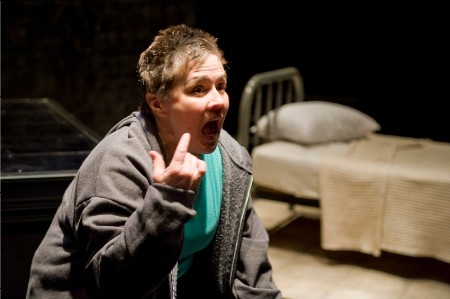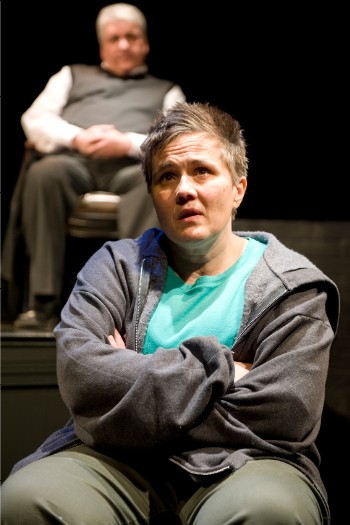Theater Review: ‘4:48 Psychosis’
This Rhode Island theater merits praise for its courage in staging dramatist Sarah Kane’s highly unorthodox portrayal of severe depression.
4:48 Psychosis by Sarah Kane. Directed by Tony Estrella. Presented by The Gamm Theatre, Pawtucket, RI, through February 7.
Casey Seymour Kim (Woman) in The Gamm Theatre
Reviewed By Caldwell Titcomb
The Gamm Theatre in Pawtucket merits praise for its courage in staging Sarah Kane’s “4:48 Psychosis.” This last of the British playwright’s five plays in a short life is highly unorthodox, being a harrowing portrayal of severe depression on the verge of suicide. It sprang from Kane’s own experience of mental illness. Though there are wisps of humor, the work essentially depicts what the protagonist calls the “rupture of the soul.”
There is no linear plot nor are there specified characters. Gender is not indicated. The play has been done as a monologue and with as many as a dozen performers. The premiere at the Royal Court Theatre in June of 2000 had a cast of two women and one man. Much is left to the discretion of the director. At the Gamm, the artistic director, Tony Estrella, opted for a female patient and a male psychiatrist, whom he labels Woman and Doctor. This is an admirable solution.
We see a hospital bed and a stool. On a raised platform there are an armchair and a coffee mug. Upstage there is a window, through which one glimpses a barren tree and falling snow. We hear a portion of a number from the greatest of all song cycles, Franz Schubert’s “Winterreise” (“Winter Journey”). In the course of the show, the tree and snow give way to a series of helpful projections.
Kane’s text consists of 24 fragments, varying in length from one line to several pages. Some of them are naturalistic dialogue, some are poems, some are unclassifiable. Some are spewed out at maximum speed, some call for Pinteresque pauses (Pinter was a strong booster of Kane when the newspaper critics pilloried her mercilessly). What is remarkable is that Casey Seymour Kim, who plays the depressed patient, gives a virtuoso performance that convinces us that all the varied speeches (she has three-quarters of the lines) and shifting moods come from the same individual.
The 4:48 of the title refers to the time she often wakes up in the morning “when sanity visits” or “when desperation visits I shall hang myself.” She tells us that “my mind is the subject of these bewildered fragments. Nothing can extinguish my anger. And nothing can restore my faith. This is not a world in which I wish to live.”
Casey Seymour Kim (Woman). Background: Tom Gleadow (Doctor). Photo by Peter Goldberg.
Sometimes she is isolated by a spotlight as she talks to herself, sometimes she is conversing with the Doctor (solidly played by Tom Gleadow), and sometimes the house lights come up as she addresses the audience directly. When she utters lists of words or of medications, these are also supplied as projections, as are photos of herself as a child when she thinks back to her earliest years.
Estrella has done a tiny bit of text tweaking. Fragment 4 is just a page of random zigzagging numerals from 100 to seven, the meaning of which is anyone’s guess. In Fragment 20 the Woman is asked to count down from 100 by subtracting seven until she reaches two. Estrella uses Fragment 20 in both places, and the Woman makes mistakes the first time and gets it right the second time. The numeral seven has a host of symbolic meanings, but it’s unclear what Kane intended—it is the symbol of pain, for one thing.
Not only is Kim’s vocal performance remarkable, but it is also highly athletic. She tears around the set and at one point takes refuge by hiding under the bed. She certainly exhibits phenomenal breath control in addition to an amazing memory.
Kane suffered from agonizing depression for some years, and on February 20, 1999, at the age of 28, she hanged herself in a bathroom of London’s King’s College Hospital. Her five plays have posthumously won her a firm place in the theatrical canon.
Tagged: 4:48 psychosis, Caldwell-Titcomb, Gamm-Theatre, Pawtucket, Rhode Island, sarah-kane

A rare insight into the troubled thoughts of the psychotic mind. Bravo for the courage to present an unexplored area.